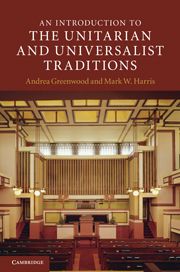Book contents
- Frontmatter
- Contents
- Acknowledgements
- A note on names
- Chapter 1 Introduction
- Chapter 2 Beginnings
- Chapter 3 Great Britain
- Chapter 4 From revelation to reason
- Chapter 5 From reason to intuition to freedom
- Chapter 6 A religion for one world
- Chapter 7 Congregational polity
- Chapter 8 Worship
- Chapter 9 Sources of faith
- Chapter 10 Science and ecology
- Chapter 11 Architecture, art, and music
- Chapter 12 Education and social justice
- Chapter 13 Current issues, new directions
- Selected bibliography
- Index
- References
Chapter 3 - Great Britain
Published online by Cambridge University Press: 05 June 2012
- Frontmatter
- Contents
- Acknowledgements
- A note on names
- Chapter 1 Introduction
- Chapter 2 Beginnings
- Chapter 3 Great Britain
- Chapter 4 From revelation to reason
- Chapter 5 From reason to intuition to freedom
- Chapter 6 A religion for one world
- Chapter 7 Congregational polity
- Chapter 8 Worship
- Chapter 9 Sources of faith
- Chapter 10 Science and ecology
- Chapter 11 Architecture, art, and music
- Chapter 12 Education and social justice
- Chapter 13 Current issues, new directions
- Selected bibliography
- Index
- References
Summary
Unitarian history in Great Britain often begins with the “father of English Unitarianism,” John Biddle (1615–1662), but the faith goes back much further, beginning with the translation of the Vulgate at the end of the fourteenth century. The Vulgate, a fourth-century Latin translation of the books of the New Testament and the Hebrew Bible, was, by the thirteenth century, both the official and the commonly used version of Christian scripture. John Wycliff (c. 1330–1384) developed a vernacular Bible to deepen a personal relationship with God, from whom all rights flowed to those who were in a state of grace. Wycliff then interpolated this belief into an attack on the institutionalized Catholic Church, which he believed had fallen into a state of sin. The Church could not claim rights that were only available as a gift of God. Wycliff proposed that the Church abandon all its property, require priests to live in poverty, and that the king eradicate the Church's endowment. He very quickly brought together the issues defining Unitarianism even today: locating authority; individualism both in piety and in the use of reason; and the relationship between assets and influence on the law.
- Type
- Chapter
- Information
- Publisher: Cambridge University PressPrint publication year: 2011



